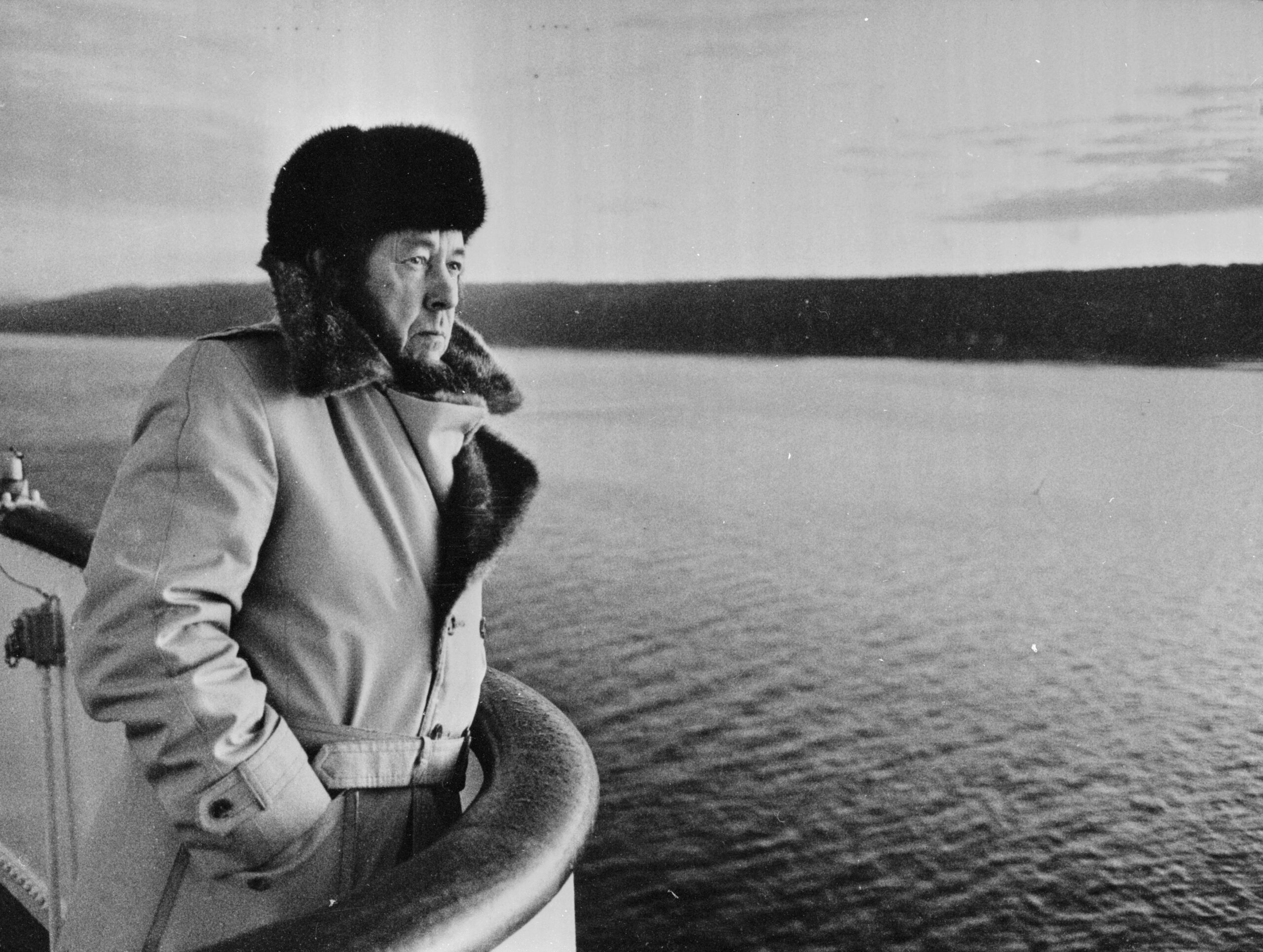Between Two Millstones, Book 2:
Exile in America, 1978–1994
By Aleksandr Solzhenitsyn
Translated by Clare Kitson and Melanie Moore
(University of Notre Dame Press, 2020)
Aleksandr Solzhenitsyn lived a harsh life. In keeping with the Russian cultural and literary disposition, one might even say that his life was tragic. He spent eight years in a forced labor camp, survived cancer, and was repeatedly abused and hounded by the Soviet authorities, especially following the 1973 publication of The Gulag Archipelago, which showed the truth about the horrors of Communism.
Solzhenitsyn was expelled from the Soviet Union in 1974. After a brief stay in Switzerland, he found a refuge in the remote woods of Vermont. Yet Solzhenitsyn found no peace there. His years in America would prove to be full of strife, not of the Soviet variety, but that of a particular kind of American collectivism. In this newly translated second part of Solzhenitsyn’s memoir of exile, we see a man caught between two worlds—his beloved home, Russia, and his refuge in America—attempting to reach some kind of personal reconciliation. This spiritual task proved rather difficult. As Daniel J. Mahoney notes in the foreword, one of the “millstones” that Solzhenitsyn felt pressed by was “an uncomprehending and increasingly hostile West.”
It may be hard for some readers to understand Solzhenitsyn’s feeling of oppression. After all, in America one is able to be free. But for Solzhenitsyn, American-style freedom was part of the problem. “The insane difficulty of the situation is that I can’t ally myself with the Communists, our country’s butchers—but I can’t really ally myself with our country’s enemies either,” he writes. “And all this time I have no home ground to support me. The world is big, and there’s nowhere to go. Two millstones.”
One of the most visible and fascinating, although not surprising, aspects of this memoir is the hatred and dismissal Solzhenitsyn encountered from the American intelligentsia. He had spent most of his life fighting against Communist ideology. For him the fight was a crisis that could not be ignored or merely theorized about. But American writers and “pseudo-intellectuals,” as Solzhenitsyn calls them, were not interested in the human reality of Communism. They saw only the abstractions of Marxist ideas.
In choosing a school for his sons, Solzhenitsyn was amazed at the academic acceptance of Marxism. He notes that despite some good teachers, he and his wife, Alya, “were surprised by [the school’s] strident socialist spirit.” The headmaster of the school even defended Stalin. This was one of the first signs of the strange opposition Solzhenitsyn would face in the United States, where the experience of the brutality of the Communist regime was unimportant because it didn’t align with ideology.
This impersonal quality is one of the hallmarks of the American left. When everything is about choosing sides, a writer is only worthy if he or she parrots the ideology the intellectual establishment has chosen to propagate. But it wasn’t only hostility from the left that Solzhenitsyn experienced. Conservatives in America were not particularly keen on his criticism of the West.
For example, on October 9, 1982, Solzhenitsyn delivered an address in Tokyo that sought to prove that Communism was universally totalitarian and had no special affinity with Asian cultures. The speech was published by National Review but “with characteristic cuts: anything that didn’t flatter the Americans was removed!” Norman Podhoretz was initially supportive of Solzhenitsyn but distanced himself over the Russian’s alleged anti-Semitism, concluding that while Solzhenitsyn was not against Jews, he exhibited no sympathy for them either. Although Podhoretz understood the significance of Solzhenitsyn’s anti-Communist mission, he was disturbed by his love of Russia. In his essay “The Terrible Question of Aleksandr Solzhenitsyn,” Podhoretz writes, “To seize upon anti-democratic Slavophilia . . . as an excuse for continuing to evade the challenge of his life . . . would only confirm the charge that we are cowards.”
Amid these reactions, Solzhenitsyn continuously made distinctions between independence and freedom. He proposed that independence in America is possible (living in Vermont, having access to books, not having one’s house searched by the authorities), but freedom was not so easily obtained. In the course of three years, nothing seemed to change for him. According to one reflection: “The age-old Bolshevik enemies are now joined by the hostile pseudo-intellectuals of both East and West and, it appears, even more powerful circles. Which is why it turns out that here, in America, I am not genuinely free, but again caged.”
Solzhenitsyn was in America but remained detached from it. One of the enduring threads of his exile was not just a vision of returning to Russia but a desire to restore Russia to her proper spirit. He saw no future in Russian émigrés, who seemed more interested in capitalistic opportunities and appeasing the pseudo-intellectual left than in defending the truth. “What kind of nation are we [Russians],” writes Solzhenitsyn, “if our brilliant diaspora—a million and a half strong, maybe two—is dying, appearing to have borne no fruit? . . . Clearly, we are not able to hold out when dispersed . . . we are not united, we lack independent initiative, and we wait for a powerful hand to bring us together.”
At the same time, America was detached from Solzhenitsyn. Throughout the memoir, it is clear to Solzhenitsyn that America’s intelligentsia and government were not interested in the real fight against Communism, only the appearance of a fight. We feel the friction between a grand literary intellect and American political rhetoric. Anticipating a phone call from the newly elected President Reagan (as promised by the new administration), Solzhenitsyn wrote a few preparatory notes. He wanted Reagan to “make a clear distinction between Communism and the Russian people” and had hoped that Reagan “would just assimilate some small understanding of the Russian point of view.” But there were too many obstacles, the phone call never happened, and Solzhenitsyn notes that “no American administration is really free—it is heavily influenced by various circles, some known publicly, others not.”
Was Solzhenitsyn demanding too much? He had no interest in the aesthetic elements of politics, such as grand state dinners or empty dialogues. Still, he acknowledged Reagan’s “humanity, sincerity, his sense of humor.”
Going His Own Way
Over the years in America, Solzhenitsyn discovered that American friendliness does not necessarily translate into friendship. In American relationships, there is always a quality of thought that remains on the surface. Solzhenitsyn was not afraid to criticize this superficiality. He particularly detested the American media that hounded him for comments on current events. “The media go all out for the news value, not profundity,” he observed. “But for me to write even the tiniest public statement I must find a solid chunk, a fusion of thought and feeling, great concentration, commitment, and the upending of my entire being.”
For Solzhenitsyn, the philosophical and political problems of our times were not to be solved in sound bites. “A writer has to reflect on the deeper elements of these problems rather than fiddle around with today’s superficial issues,” Solzhenitsyn insisted. “It is a call of time from above.” A quasi-religious conception of the intellectual’s authority is, or was, common in Europe but remains alien in America. Here, Solzhenitsyn found, a writer must also be a businessman and a personality that successfully brands himself in order to “sell” the intellectual goods. This was utterly reprehensible to his understanding of his vocation.
Solzhenitsyn was stubborn in his refusal to adopt American ways, as Alya many times pointed out to him. She worked tirelessly to keep him on an even keel. For this Solzhenitsyn expressed his gratitude and love repeatedly. But what would assimilation have looked like? Should Solzhenitsyn have become a voice of support for American values in order to be accepted by the right? Should he have muted his criticism of Marxism so as to be accepted by the left, and therefore by the intellectual establishment? Should he have expressed more loudly to the American people how grateful he was to be in America? Should an émigré ignore the innermost parts of his being in order to thrive in the society where he finds refuge? What would that mean to a human being who endured the hard fist of Communism only to be told that he needs to change existentially if he is to be free? Isn’t that a prison as well, despite the promises and possibilities of freedom?
As time passed, Solzhenitsyn recognized some of his naivete about the possibilities of American liberty and politics. For example, he eventually praised Ronald Reagan as a man of moral constitution, if not the lone savior of Russia. Even so, Solzhenitsyn’s stateless period (he and Alya chose not to become American citizens) poses a serious question that is relevant not only to émigrés. How can any one of us refuse every form of collectivism—not just those that occur far away? Solzhenitsyn strove for authenticity and did not mask his opinions. Speaking the truth all the time may be a call from God (as it was for him), but human beings generally avoid it.
Solzhenitsyn’s life in America was attended by sorrow and fatigue but also by displays of great strength. He appears in this volume as a man afraid of running out of time to make a contribution to Russia’s rebirth. He has immense gratitude for small corners of Vermont, but his soul aches because he knows that he “had to get to Russia in time to die there.” This memoir exemplifies the difficult question of belonging. Without slipping into clichés, Solzhenitsyn challenges both émigré and American alike to seek the truth, not only of one’s own existence, but also that of a nation.
Emina Melonic is a book and film critic living near Buffalo, New York.














